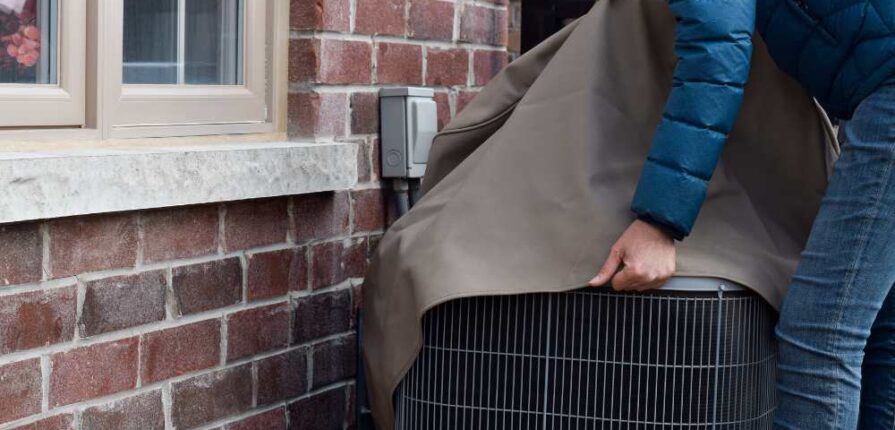How to Protect Your Outdoor HVAC Unit from Falling Leaves and Debris
As the leaves begin to fall and autumn sets in, your outdoor HVAC unit may be more vulnerable to debris buildup. Fallen leaves, twigs, and other debris can quickly clog your unit, leading to reduced airflow, decreased efficiency, and even system damage. With just a few preventative steps, you can protect your outdoor unit and keep your HVAC system running smoothly throughout the fall and winter. Here’s how to safeguard your HVAC system from the seasonal debris.
1. Clear the Area Around Your HVAC Unit
The first step in protecting your outdoor HVAC unit is ensuring the area around it is free from debris. Fallen leaves, twigs, and other plant matter can easily accumulate near your unit and block airflow. Make it a habit to regularly:
- Rake leaves and clear debris around the base of your unit.
- Trim back nearby trees, shrubs, or bushes to ensure branches or leaves won’t fall into the unit.
- Create a 2-3 foot clearance zone around the HVAC system by removing anything that could block airflow or contribute to debris buildup.
By maintaining a clear zone around your unit, you help ensure that air can move freely through the system, which is essential for optimal performance.
2. Invest in a Protective Cover for Your HVAC Unit
One of the most effective ways to prevent debris from entering your outdoor HVAC unit is by using a protective cover during the fall season. Covers are designed to keep leaves, dirt, and other debris from accumulating inside the unit, but it’s important to choose the right one.
- Choose a breathable cover: While it’s tempting to completely seal off the unit, a tightly sealed cover can trap moisture inside, leading to rust or mildew. Opt for a cover made from breathable material that allows airflow while keeping debris out.
- Use a cover during the off-season: If you won’t be using your air conditioner during the cooler months, a cover can provide added protection. However, if your HVAC unit is also used for heating, be mindful of when to cover and uncover it.
- Remove the cover before using the unit: Always remove the cover when the system is in operation to avoid airflow restriction.
3. Install a Protective HVAC Mesh or Screen
If you live in an area where leaves and debris are abundant, you may want to consider installing a protective mesh or screen around your HVAC unit. This can act as an extra barrier without restricting airflow. Here’s what to consider:
- HVAC mesh guards are typically made of durable materials and can be easily installed around the sides of the unit to catch falling leaves and prevent them from entering.
- Custom-fit screens can provide added protection while allowing airflow. Make sure to choose a screen specifically designed for your unit’s size to avoid blocking the system’s intake or exhaust.
Mesh and screen options are great for homeowners who experience heavy leaf fall or live near wooded areas.
4. Perform Regular Inspections and Cleaning
Even with a cover or screen, it’s important to regularly inspect and clean your HVAC unit to ensure no debris has made its way inside. You should:
- Check for leaves or twigs inside the unit, especially after a windy day.
- Clean off the top of the unit: Use a broom or leaf blower to gently remove any debris from the top of the system.
- Remove debris from the fan and condenser: Carefully remove any leaves or dirt that may have gotten into the fan blades or condenser to prevent overheating or mechanical issues.
Regular inspections can help you catch potential problems early before they lead to costly repairs or reduced system efficiency.
5. Schedule Professional Maintenance
While routine cleaning and inspections are essential, scheduling professional maintenance in the fall is the best way to ensure your outdoor HVAC unit is in top condition. A trained HVAC technician will:
- Inspect the unit’s components for any debris or damage.
- Clean the condenser coils to improve efficiency and airflow.
- Check refrigerant levels and ensure the system is working properly for the upcoming winter months.
During this maintenance visit, the technician can also advise you on any additional steps you can take to protect your unit based on the layout of your yard and the trees surrounding your home.
6. Avoid Piling Leaves or Yard Waste Near the Unit
It can be tempting to rake leaves into piles for later disposal, but always keep these piles far away from your HVAC unit. Wind and weather can easily blow the leaves into the unit, causing clogs and other issues. Instead:
- Dispose of leaves promptly to prevent them from being scattered by the wind.
- Create a composting area far from the HVAC system if you compost leaves or other yard waste.
Keeping yard waste at a distance will reduce the likelihood of debris getting into the system.
7. Monitor the Weather and Act Quickly
During the fall, strong winds, storms, and heavy rain can cause significant amounts of debris to accumulate around your HVAC unit. After any major weather event:
- Inspect the unit and surrounding area for fallen leaves, branches, or debris.
- Clear away any blockages to ensure your system is running efficiently.
Prompt action after storms can prevent issues before they start.
Conclusion
Taking the time to protect your outdoor HVAC unit from falling leaves and debris during the fall season can save you from expensive repairs and keep your system running efficiently. By clearing the area, using a breathable cover, installing protective mesh, and scheduling professional maintenance, you’ll ensure your HVAC system is ready to keep you comfortable throughout the colder months. For expert advice or professional maintenance services, contact AirTexas AC today and prepare your HVAC system for the upcoming winter.

